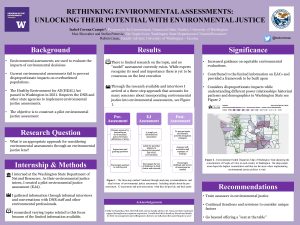RETHINKING ENVIRONMENTAL ASSESSMENTS: UNLOCKING THEIR POTENTIAL WITH ENVIRONMENTAL JUSTICE
Environmental justice (EJ) is crucial as it considers the various obstacles overburdened communities encounter. EJ is especially vital when constructing evaluations that influence future actions. So, what role do environmental assessments play in all of this, and more importantly, how can we avoid further marginalizing already burdened communities? This study aims to identify the obstacles and opportunities of constructing an environmental justice assessment. As the environmental justice intern at the Washington State Department of Natural Resources (DNR), I was tasked with creating a pilot environmental justice assessment (EJA). I collected evidence from informal interviews, extensive research analysis, and DNR staff feedback. After consolidating all the evidence, I determined that a three-step approach can address various concerns about the integration of EJ into environmental assessments. This straightforward yet comprehensive three-step approach consists of a pre-assessment, EJ assessment, and post-assessment. The significance of these findings lies in their potential to establish an unbiased environmental evaluation process that does not disproportionately impact already marginalized communities. Finally, this three-step approach offers a clear strategy for conducting environmental justice assessments and contributes to the scarce knowledge available.
